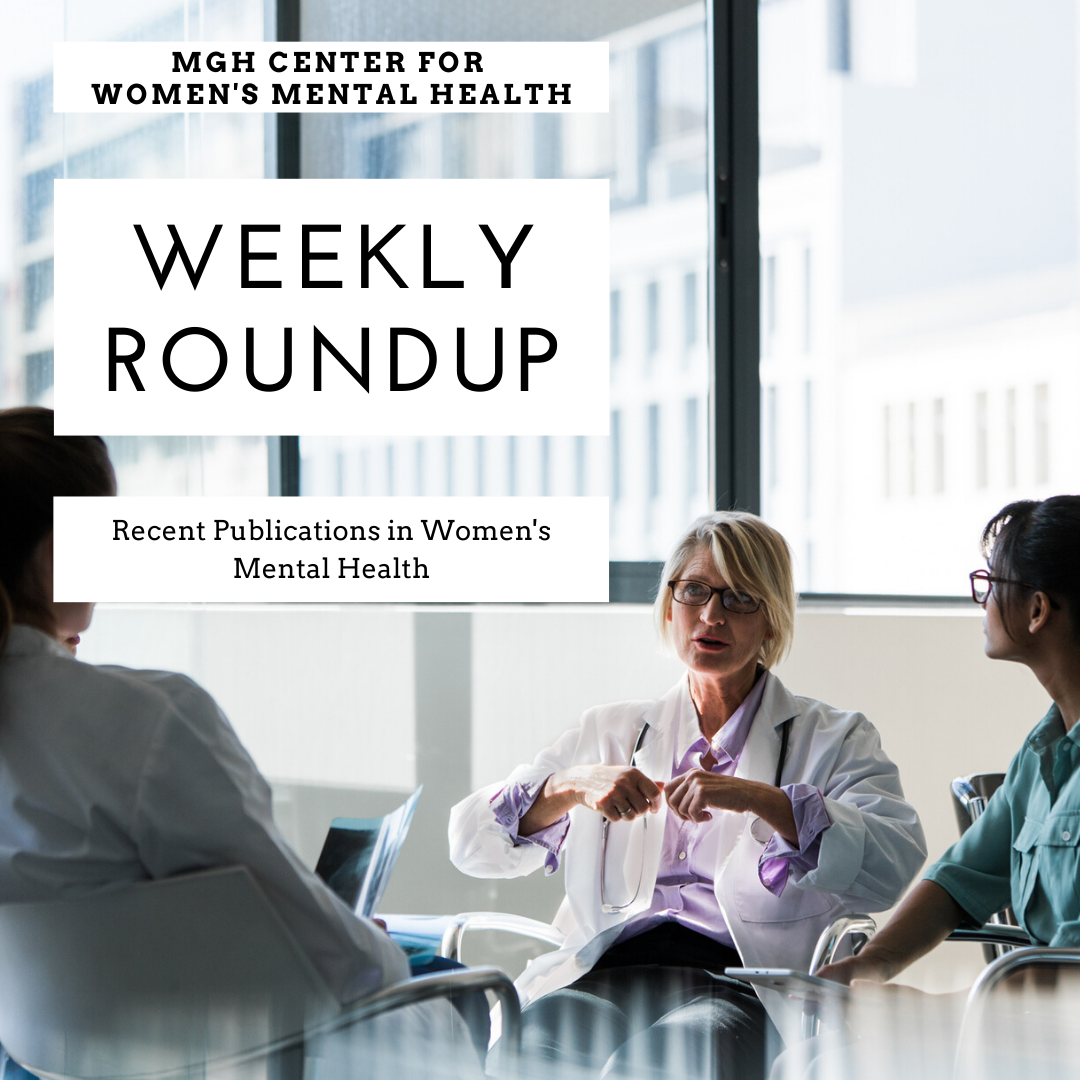
Every week we review the most recent publications in women’s mental health, covering topics related to premenstrual symptoms, perinatal mood and anxiety disorders, use of medications in pregnant and breastfeeding women, perinatal substance use, and menopausal mental health.
For more detailed descriptions of many of these topics, you can sign up to receive our weekly CWMH NEWSLETTER which comes out every Thursday.
And don’t forget to visit ESSENTIAL READS – a curated selection of up-to-date and clinically relevant articles in women’s mental health.
Ruta Nonacs, MD PhD
PMS AND PMDD |
| No articles this week
|
INFERTILITY AND MENTAL HEALTH |
| No articles this week
|
PSYCHIATRIC ILLNESS DURING PREGNANCY |
| The Crisis of Perinatal Mental Health in the Age of Covid-19.
Osborne LM, Kimmel MC, Surkan PJ. Matern Child Health J. 2021 Mar;25(3):349-352. Free article.
|
MEDICATIONS AND PREGNANCY |
| Effectiveness of patient decision aids in women considering psychotropic medication use during pregnancy: a literature review.
Broughton LC, Medlicott NJ, Smith AJ. Arch Womens Ment Health. 2021 Mar 9. This paper reviews the use of patient decision aids in two pilot randomised controlled trials in women considering antidepressant use during pregnancy, and one non-randomised study in women considering medication for the treatment of opioid use disorder (OUD). The PDAs had good acceptability across all three studies. There was a non-significant trend toward reduced decisional conflict and anxiety in women using decision aids. Freeman MP, Viguera AC, Góez-Mogollón L, Young AV, Caplin PS, McElheny SA, Church TR, Chitayat D, Hernández-Díaz S, Cohen LS. Arch Womens Ment Health. 2021 Mar 12. For 163 infants born to women in the aripiprazole-exposed group, seven major malformations were confirmed (4.29%). Compared to 690 pregnancies without aripiprazole exposure, the adjusted odds ratio for major malformations was 1.35 (95% confidence interval [CI] = (0.43, 4.20), a finding which is not statistically significant.
|
POSTPARTUM PSYCHIATRIC ILLNESS |
| Improving the mother-infant relationship following postnatal depression: a randomised controlled trial of a brief intervention (HUGS).
Holt C, Gentilleau C, Gemmill AW, Milgrom J. Arch Womens Ment Health. 2021 Mar 19. Incorporating the HUGS intervention following depression treatment is effective for improving mother-infant relationships. A longer-term follow-up and larger sample size may be needed for improved mother-infant relationships to show an impact on observable child developmental outcomes. van der Zee-van den Berg AI, Boere-Boonekamp MM, Groothuis-Oudshoorn CGM, Reijneveld SA. J Affect Disord. 2021 Mar 4;286:158-165. There are shared, as well as distinct, risk factors for postpartum depression and anxiety.
|
MEDICATIONS AND BREASTFEEDING |
| No articles this week
|
PERINATAL SUBSTANCE USE |
| Wymore EM, Palmer C, Wang GS, Metz TD, Bourne DWA, Sempio C, Bunik M. Persistence of ?-9-Tetrahydrocannabinol in Human Breast Milk.JAMA Pediatr. 2021 Mar 8.
THC detectable in breast milk for six weeks after last use.
|
MATERNAL MENTAL HEALTH AND CHILD OUTCOMES |
| Perinatal depression and children’s developmental outcomes at 2 years postpartum.
Nix L, Nixon E, Quigley J, O’Keane V. Early Hum Dev. 2021 Mar 13;156:105346. In contrast to other studies, this study did not observe any associations between mothers’ depression and children’s social-emotional, cognitive or language development were observed. However, an unexpected positive association between maternal depression and children’s social adaptive behaviour was found, which conferred an advantage on children whose mothers had suffered from depression. This study was small, however, with 11 depressed participants, 21 with a history of depression, and 29 control participants. There was significant attrition in the depressed subgroup with 12 out of 23 mothers with depression dropping out of the study before their child was assessed. Kjerulff KH, Attanasio LB, Sznajder KK, Brubaker LH. J Psychosom Res. 2021 Mar 17;144:110424. Childbirth related PTSD was consistently associated with lower levels of maternal-infant bonding over the course of the first year after first childbirth. Galbally M, Watson SJ, Lappas M, de Kloet ER, van Rossum E, Wyrwoll C, Mark P, Lewis AJ. Psychoneuroendocrinology. 2021 Mar 12;127:105197. These findings suggest that the relationship between maternal antenatal depression and anxiety and infant cortisol reactivity is mediated through placental 11?-HSD2 mRNA expression. Rotem-Kohavi N, Virji-Babul N, Oberlander TF. Infant Behav Dev. 2021 Mar 10;63:101545. Infants exposed to high levels of depressive symptoms during pregnancy showed higher modularity – reflecting reduced perceptual-dynamics – for viewing happy emotions compared to sad emotions. The opposite was observed for infants exposed to lower levels of depressive symptoms during pregnancy. These preliminary findings suggest that prenatal depressive mood may shape early functional organization for viewing emotional faces.
|
MENOPAUSE AND MENTAL HEALTH |
| No articles this week
|
OTHER TOPICS IN WOMEN’S MENTAL HEALTH |
| Contraception for Women With Psychiatric Disorders.
McCloskey LR, Wisner KL, Cattan MK, Betcher HK, Stika CS, Kiley JW. Am J Psychiatry. 2021 Mar 1;178(3):247-255. Proactive management of mental illness, contraception, and pregnancy improves a woman’s capacity to function and optimizes her mental and reproductive health. |



Leave A Comment